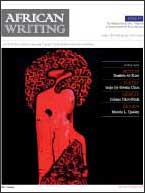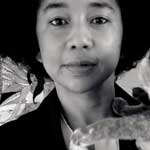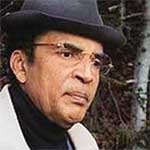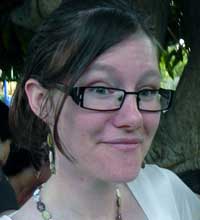A View From The North
The “not-quite-a-renaissance” of Arabic literature — as it’s been called by critic Rasheed al-Enany — has, in the last decade, been gaining attention outside of the Arabic-reading world. North African literature has traditionally been separated from literatures called “African.” But a recent surge in translations and publications has made Arabic literature more accessible to readers south of the Sahara. According to leading Arabic-English translator Humphrey Davies, this boom began in 2001.
“There probably was a little time lag — telephones weren’t ringing on the 12th of September,” Davies said. But the September attacks in the United States were “probably …the biggest thing” spurring a new global interest in Arabic literature.
The advent of the “Arabic Booker” in 2007 also has played a role in making North African literature more transparent and accessible to non-Arabic readers. In the award’s first three years, shortlisted authors have included Egyptians Muhammad Mansi Qandil (whose beautiful Moon over Samarqand is available from AUC Press), Mansoura Ezz Eldin, Muhammad al-Bisatie, and Mekkawi Said, as well as Tunisian author Habib Selmi. Egyptians Bahaa Taher and Youssef Ziedan won the prestigious prize. All of the aforementioned authors, save Ziedan, have works available in translation, and his prize-winning Azazel is forthcoming next summer from Atlantic Books.
As is evident from the above list, Egypt is the largest producer of North African literature. An oft-repeated saying asserts that Egyptians write, the Lebanese publish, and the Iraqis read. In some ways, the Arabic literary scene has changed for the better, with more new writing coming from outside of Cairo. On the other side, Iraqi literacy rates have plummeted. Nonetheless, readers are still finding strong novels from the big five North African nations, as well as from the North African diaspora in Europe and the United States.
***
In Egypt, comic-satiric novels are a growing part of the literary landscape, and commentators regularly insist that Egyptian fiction has become “bored of big issues.” Yet Egyptian fiction continues to find new ways to talk about history, fiction, war, and personal freedoms. The popular light satire Ayza Atgowaz (2008), (I Want to Get Married!) which stemmed from author Ghada Abdel Aal’s blog, became a book, and then was turned into a soap opera this last Ramadan. The book doesn’t directly address “big” political issues, but it does ferret out societal contradictions and highlights the country’s so-called “marriage crisis” in a humorous way.
I Want to Get Married! appeared in English, translated by Noha Eltahawy, in October 2010 (University of Texas Press). Numerous other Egyptian books are out in translation this fall, including Radwa Ashour’s auto-fictional Specters and two new-to-English novels by Nobel Prize winner Naguib Mahfouz. But the most notable Egyptian novel in translation this year is Stealth (2010, Aflame) by maverick writer Sonallah Ibrahim.
Ibrahim is one of the pillars of contemporary Egyptian literature. He is no longer much favored with literary awards, perhaps because he took the opportunity of his 2003 “Novelist of the Year” prize to deliver a blistering critique of the state. He ended his brief speech by saying he would not accept a literary honor from “a government that, in my opinion, does not possess the credibility to grant it.” His most recent book, Stealth, translated by Hosam Aboul-Ela, is a strong departure from his earlier socio-political novels, like Zaat and Honor, in that this work is also very emotional and very personal. It’s narrated by a young boy whose family circumstances are similar to what Ibrahim’s were in post-WWII Egypt, when the nation was on the cusp of independence.
Among significant books that appeared in Arabic in Egypt this past year are Ibrahim Aslan’s family drama Two Rooms and a Hall (December 2009), Radwa Ashour’s book about the Palestinians’ expulsion from what is now Israel, Tantoureya (2010) and Miral al-Tahawy’s Brooklyn Heights (2010). All of these authors have works available in English.
***
From neighboring Libya, comparatively little has been translated. But the ranking fictional heavyweight, Ibrahim al-Koni, is a heavyweight indeed — it is always surprising to see him absent from Nobel Prize shortlists. Al-Koni has published more than eighty books, including the 2009 novel Who Are You, O Angel? Several of Al Koni’s works have appeared in English in the last decade: Two notable recent translations are The Puppet, released this fall (University of Texas Press 2010), translated by William Hutchins, and Gold Dust (AUC Press 2008), translated by Elliott Colla. Al-Koni hails from Libya’s southern desert, where he grew up among the Tuareg people. His novels center on the clash between humans and their environments — and other battles spurred by human greed — in a fresh, complex, allegorical style.
Other major Libyan authors include Ahmed Fagih, who, like al-Koni, is from Libya’s “sixties generation” of writers. Fagih’s classic Gardens of the Night was published in English by Quartet, translated by Amin al-Ayouti and Suraya Allam. Among the younger Libyan authors, Libyan-British Hisham Matar writes in English; his In the Country of Men was shortlisted for the 2006 Man Booker, and Libyan-American Khaled Mattawa has won numerous awards both for his poetry and his translations. His most recent collection of poems, Tocqueville, appeared in 2010.
***
The current issue of Banipal (39), the London-based magazine of Arab literature in English, is devoted almost wholly to Tunisian writings. Commentator Hassouna Mosbahi writes about outstanding contributors to modern Tunisian literature, and the magazine also offers portraits of Salah Eddine Boujah and Ezzedine Madani. But, although Tunisia has ten different authors who made the Arab Writers Union’s list of the last century’s “top 105” Arabic novels, only one of these authors has had a book translated into English.
Younger Tunisian writers, however, are making more headway in international writing waters. Banipal 39 features work from Habib Selmi, whose “Arabic Booker” shortlisted novel, The Scents of Marie Claire, was released early in 2010 from AUC Press. The translation of Selmi’s novel, by Fadwa Qasem, is a bit clunky, but the author’s psychological insights about cross-cultural relationships are deft. His more recent The Women’s Orchard (published in Arabic in 2010) is narrated by a Tunisian who has come from Paris to visit his brother. The narrator makes big-picture observations about changes in family, culture, and the country’s religious landscape. But more interesting than these are the small psychological insights that are Selmi’s hallmark. Two chapters of The Women’s Orchard appear in English in the current issue of Banipal.
Banipal 39 also features a story by Kamel Riahi, the sole Tunisian among the “Beirut39,” the list of 39 up-and-coming Arab writers under 40 with was settled under the Hay Festival umbrella. Riahi’s work, which particularly examines Arab racism, also appears in the new anthology Emerging Arabic Voices (Saqi Books, 2011).
***
In neighboring Algeria, Francophone literature has been a much larger force. The Algerian author regularly mentioned as “in the running” for the Nobel Prize for Literature, Assia Djebar, writes in French. Her most recent novel, Nulle Part Dans la Maison de Mon Père, has not been published in English, although her powerful Women of Algiers in their Apartment and Fantasia: An Algerian Cavalcade, are both available in translation. A number of other Algerians are making their mark not in Arabic but in French, among them the popular Faïza Guène and the critically acclaimed El-Mahdi Acherchour, a poet and novelist whose Moineau has been longlisted for the prestigious Femina prize.
Indeed, this year’s most notable Algerian novel in translation is from Francophone author Leila Marouane: The Sexual Life of an Islamist in Paris (2010, Europa). The novel is a fascinating deconstructive, post-modern look at a man torn between two worlds: his North African upbringing and his desire to be fully French, fully “free.”
Among Arabic-writing novelists, Ahlem Mosteghanemi is one of the most popular, and her Memory in the Flesh (translated by Baria Ahmar Sreih and Peter Clark, published by AUC Press) has its avid fans and strong detractors. While the book made the Arab Writers Union’s “top 105” list, critic Youssef Rakha laments “the patently poor quality of Mosteghanemi writing” which he calls “some of the worst ever produced in the language.” Mosteghanemi is primarily occupied by the relationships between Arab men and Arab women. Her Nessyane.Com, about male abuse of women, is scheduled to appear in English from Bloomsbury-Qatar next year.
***
On the far western side of North Africa, in Morocco, French is also a major language of literary production. And there is significant writing from Moroccans who live outside of the country — from the French-Moroccan diaspora, and also from Dutch-Moroccans. Tahar Ben Jelloun is probably the most prolific French-Moroccan author, and his accomplished poetry collection, The Rising of the Ashes, appeared early in 2010 (City Lights). Among significant younger authors are French-Moroccan Abdellah Taia and Dutch-Moroccan Abdelkader Benali. Taia’s “autobiographical novel,” Salvation Army, appeared in 2009 from Semiotext(e). It tells the coming-of-age story of a gay man born in Sale, Morocco. Taia’s prose is also featured in the Beirut 39 anthology, alongside that of Benali.
But the most significant living Moroccan writer is probably Bensalem Himmich, who writes in Arabic and whose The Polymath (AUC Press 2004) won the Naguib Mahfouz medal for literature in 2002. The ambitious novel is an historical fiction about the later life of philosopher Ibn Khaldun, and manages to be both a novel of ideas and a story about death and love.
***
As Chinua Achebe said, in an interview with the journal Conjunctions: “Many people think of Egypt as being part of the Middle East, but it’s always been in Africa.” Indeed. And, as stronger and more accessible translations break down language barriers, perhaps North African writings can more easily become a part of the African literary conversation. 
![]()










